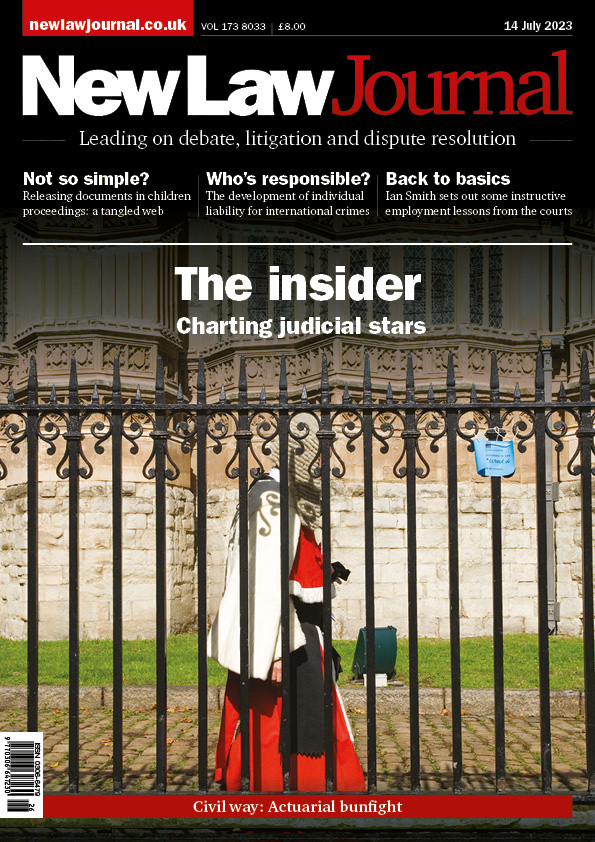THIS ISSUE

Which judges are tipped for the top jobs? In this week’s 'Insider', Professor Dominic Regan, of City Law School, praises Dame Sue Carr, the next Chief Justice, and reveals how her career could have taken an alternative albeit still high-profile trajectory!
Rules should be ‘simple and simply expressed’, according to the Courts Act 2003—yet Mr Justice Mostyn recently urged rule-makers to look again at the ‘Byzantine’ rules governing the release of documents to children proceedings.
The rise of legal consultants has been a game-changer for lawyers who want to work independently, manage their own caseload, and reduce the burdens of self-employment. In this week’s NLJ, Adrian Jaggard, CEO at AllC Group & Taylor Rose MW, looks ahead to the expansion of this model of working—research suggests one third of lawyers will work this way by 2026—and offers advice on how to prepare now for the changes to come.
The Nuremberg trials laid the groundwork for personal international criminal liability, and the process by which Vladimir Putin may one day be held responsible. In this week’s NLJ, Simon Parsons, associate lecturer at Bath Spa University, looks at the lack of individual liability for international crime before 1945.
As the courts gear up for the Long Vacation, Dominic Regan charts judicial stars on the rise & recommends a handy surgical procedure for costs lawyers
Back to school already? Ian Smith sets out some instructive lessons from the courts on the definition of a worker, the conduct of disciplinary hearings, & the perils of making a mistake
A Byzantine set of rules governs the release of documents in children proceedings: David Burrows calls for some sorely-needed simplicity
The courts in the Cayman Islands have shown a willingness to explore the link between insolvency & trust law in resolving novel issues: Christopher Levers & Jordan Constable analyse a recent example
In the first of a two-part series, Simon Parsons charts the development of individual liability for international crimes
Service without a seal; reducing tax penalties; no jokes: the Glancing blow; coughing impecuniosity; actuarial bunfight; chancery talk.
MOVERS & SHAKERS

Keystone Law—Milena Szuniewicz-Wenzel & Ian Hopkinson
International arbitration team strengthened by double partner hire

Coodes Solicitors—Pam Johns, Rachel Pearce & Bradley Kaine
Firm celebrates trio holding senior regional law society and junior lawyers division roles

Michelman Robinson—Sukhi Kaler
Partner joins commercial and business litigation team in London
NEWS
The government has pledged to ‘move fast’ to protect children from harm caused by artificial intelligence (AI) chatbots, and could impose limits on social media as early as the summer
All eyes will be on the Court of Appeal (or its YouTube livestream) next week as it sits to consider the controversial Mazur judgment
An NHS Foundation Trust breached a consultant’s contract by delegating an investigation into his knowledge of nurse Lucy Letby’s case
Draft guidance for schools on how to support gender-questioning pupils provides ‘more clarity’, but headteachers may still need legal advice, an education lawyer has said
Litigation funder Innsworth Capital, which funded behemoth opt-out action Merricks v Mastercard, can bring a judicial review, the High Court ruled last week







